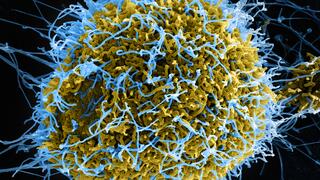Antibodies
Antibodies are proteins that are generated in vertebrates in response to certain substances (antigens). They are an important part of the immune system.
Detailed description
Antibodies (also known as immunoglobulins) are produced mainly by plasma cells due to a B-lymphocyte response. They are used by the immune system to neutralize pathogens such as pathogenic bacteria and viruses. Antibodies are produced in the organism when B-cells come into contact with a suitable antigen. As a result, the B-cell becomes activated and differentiates into a plasma cell that secretes large amounts of antibody. These antibodies are capable of specifically binding the antigen.
Broadly neutralizing antibodies currently play a special role: they are effective against several strains of a pathogen and are being researched in HIV and hepatitis C in particular.




